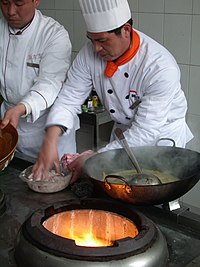Cooking is the process of preparing food by applying heat, selecting, measuring and combining of ingredients in an ordered procedure for producing safe and edible food. The process encompasses a vast range of methods, tools and combinations of ingredients to alter the flavor or digestibility of food. Factors affecting the final outcome include the variability of ingredients, ambient conditions, tools, and the skill of the individual doing the actual cooking.
The diversity of cooking worldwide is a reflection of the aesthetic, agricultural, economic, cultural, social and religious diversity throughout the nations, races, creeds and tribes across the globe.
Applying heat to a food usually, though not always, chemically transforms it, thus changing its flavor, texture, consistency, appearance, and nutritional properties. Methods of cooking that involve the boiling of liquid in a receptacle have been practised at least since the 10th millennium BC, with the introduction of pottery.[citation needed]
A person who cooks as a profession is called a chef.
History of cooking
There is, as yet, no clear evidence as to when cooking was invented. Richard Wrangham argues that cooking was invented as far back as 1.8 million to 2.3 million years ago. Other researchers believe that cooking was invented as late as 40,000 or 10,000 years ago. Evidence of fire is inconclusive as wildfires started by lightning-strikes are still common in East Africa and other wild areas, and it is difficult to determine as to when fire was used for cooking, as opposed to just being used for warmth or for keeping predators away. Most anthropologists contend that cooking fires began in earnest barely 250,000 years ago, when ancient hearths, earth ovens, burnt animal bones, and flint appear across Europe and the middle East. Back 2 million years ago, the only sign of fire is burnt earth with human remains, which most anthropologists consider coincidence rather than evidence of intentional fire


No comments:
Post a Comment